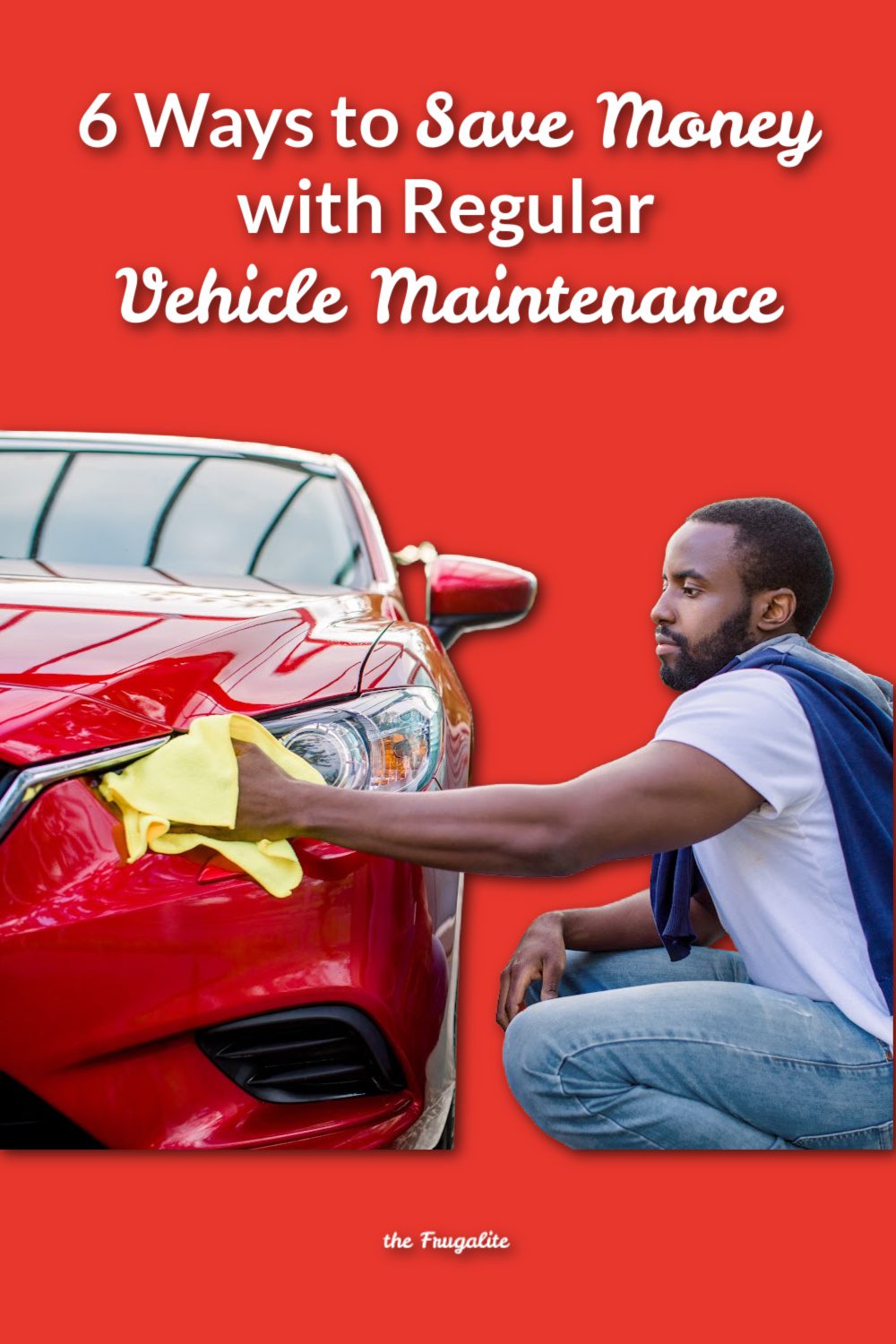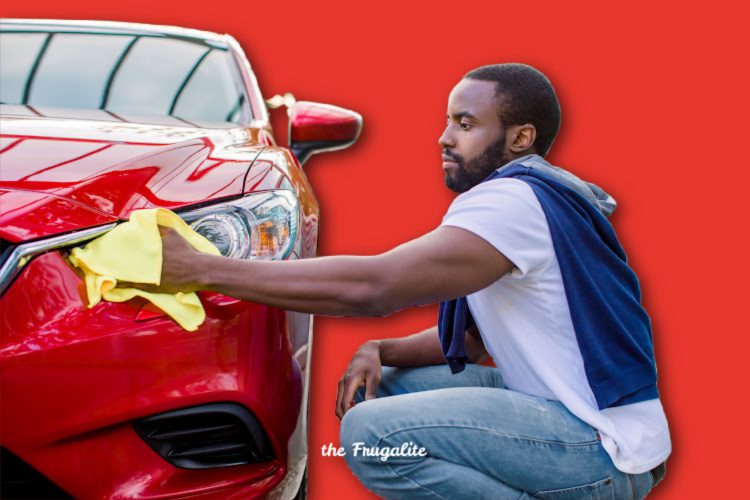(Psst: The FTC wants me to remind you that this website contains affiliate links. That means if you make a purchase from a link you click on, I might receive a small commission. This does not increase the price you’ll pay for that item nor does it decrease the awesomeness of the item. ~ Daisy)
One of the most frustrating parts about owning a car is paying the mechanic his money. For those attempting to live as frugally as possible, an $800 car repair bill can be quite the financial setback. Fortunately, there are things you can do now which will help you to prevent expensive mechanic bills in the future. You can actually save money with regular vehicle maintenance.
How? What are these tips?
Let’s take a look…
1. Wash your car regularly.
Oof. I confess this is something I have a hard time doing. My vehicles have suffered as a result. If you fail to regularly wash your car, it is only a matter of time until you begin to have problems with your paint job and rust.
I’m currently living that right now, as I’ve had to touch up numerous parts of my truck with a paint pen. In addition, sap drippings from pine trees have hardened into a gray cement all over. I’ve found nothing that takes them off.
But it’s not just your paint you need to think about here. Consider your car’s undercarriage. If you live in an area that gets hit hard with snow or that is near the coast, the salt that gets underneath your car can wreak absolute havoc on your undercarriage.
Your suspension will wear out quicker, pipes will rust, and you can easily develop leaks in things you don’t want to have leaks in. So, you’re not only talking about lower resale value (because of the poor paint job), but you’re also talking about hefty mechanic bills.
To replace one suspension shock is at least $830. You can imagine what the other repairs could cost. So spend a little bit of time once a month to take care of your vehicles. Your wallet will thank you.
2. Keep your coolant levels topped off.
Here’s another lesson I learned the hard way (why don’t they teach this stuff in school?). If your vehicle runs out of coolant, your engine is going to overheat. When your engine overheats, you’re looking at permanent damage that will lead to your needing a new engine.
Shoot, you could end up needing a new car.
An overheated engine will cause parts to swell and potentially leak oil. Leaking oil all over a super-hot engine is a recipe for an engine fire.
Let’s assume you don’t let things get that far though. Let’s assume that your engine overheats, parts break, and you’re left stranded on the side of the road (without a fire). Aside from the cost of a tow, the average cost of an engine rebuild is somewhere between $2000 and $4500.
The price of a jug of coolant? Less than $20.
Sounds like a good trade to me.
3. Please, get regular oil changes.
We’ve already established that rebuilding your engine is a nightmare. In many cases, if you get to the point where the mechanic says you need to rebuild the engine, you may as well just go out and hunt for another car.
You must take care of your engine.
Much like with overheating, if you aren’t getting regular oil changes, you can end up causing permanent damage. That oil draws heat away from the engine. When it turns into goop, it doesn’t do that anymore. The end result is, once more, an overheated engine. A minor amount of vehicle maintenance here now can save you a world of hurt later.
In most places, you can get an oil change done for around $30. You can do it yourself as well, of course, but I’ve found the savings are typically marginal (around $5). I’d rather let somebody else deal with the hassle in that case.
4. Regularly replace your air filters.
If there’s one thing I think we’re all guilty of it’s telling the Jiffy Lube guy we don’t want him to replace the air filter. These really aren’t that expensive of a part though, and they do your engine a world of good.
All the air that comes into your engine goes through that filter. The dirtier that filter is, the less air your engine will get, and the poorer it will run. You can actually end up with an air filter fire as well (fire seems to be a common end point for poor vehicle maintenance, does it not?).
So, change your air filter. This simple act of vehicle maintenance only costs you a couple of bucks, will help your engine run better, will keep you from developing costly engine problems long term, and can even protect your engine from fire.
5. Keep your tires properly inflated.
Gas is a funny thing. It likes to leave at the worst time. (Yes, I am still talking about cars, though I’ve a buddy who can attest to first dates also being a bad time for gas to leave.)
As time goes on, you can end up with small amounts of air escaping from your tires. If the PSI eventually drops too low, you’re going to end up driving on a deflated tire. If we’re talking about a tire that’s not completely flat – just on the lower end of the PSI spectrum – you’re not only going to end up with worse gas mileage, but you’re going to wear your tires out sooner as well.
Four new tires, on average, will run you right around $600.
Yeah, you’ll have to spend that $600 eventually anyway, but I’d much rather spend $600 once every 2-3 years, rather than once every 18 months.
The other reason you need to ensure you’re regularly checking your tire’s air pressure is so that you don’t end up driving on a flat. If you end up unwittingly doing this, you can damage your actual wheel. At the very least, this will cost you several hundred dollars. If your flat suddenly causes catastrophic damage as you’re driving down the interstate, it could cost you your life.
So, keep your tires properly inflated. Air is often free at gas stations, and you can easily check your PSI with a simple tire pressure gauge.
6. Regularly check your tire tread.
This is free, and it can save you thousands in repairs, higher insurance costs, medical bills, or even your life. When your tires go bald, you need to replace them. You’ll end up in a wreck due to loss of traction or due to a tire blowing out if it wears too thin otherwise.
All you have to do is use Abe Lincoln’s head.
Seriously.
Get yourself a penny, and stick ol’ Abe upside down in the tread. If the tire tread doesn’t go past Lincoln’s head, your tires are bald. You need to spend the money on new tires. It’s a big maintenance cost, I understand, but it’s significantly less than a trip to the emergency room.
Vehicle maintenance is typically easy to do and gives a big payout.
Nobody likes getting stuck with massive mechanic bills. But it’s even worse when you discover that the problem: A) could have been avoided, and B) is your fault. While you’ll never be able to escape 100% of all expensive vehicle repair bills, you can do a number of things to significantly improve your vehicle’s performance and longevity. The above tips are a good place to start.
What are your thoughts though? Are there other good car maintenance habits that can potentially save you hundreds of dollars? Let us know in the comments below!
About Aden
Aden Tate is a regular contributor to TheOrganicPrepper.com and TheFrugalite.com. Aden runs a micro-farm where he raises dairy goats, a pig, honeybees, meat chickens, laying chickens, tomatoes, mushrooms, and greens. Aden has two published books, The Faithful Prepper and Zombie Choices. You can find his podcast The Last American on Preppers’ Broadcasting Network.












2 thoughts on “6 Ways to Save Money with Regular Vehicle Maintenance”
My favorite inspiration for long lived cars is the story of this guy who racked up over 3 million miles on his 1966 Volvo. At one point he offered to sell it to the Volvo company for only a dollar for every mile on it, but the company chickened out on that offer. Here is that story:
https://www.foxnews.com/auto/irv-gordon-who-drove-his-1966-volvo-over-3-million-miles-dead-at-78
That car was made long before cars became utterly dependent on a maze of electronics and mechanics with high dollar diagnostic tools and the training to use them. All that jacks up the cost of maintenance. It also makes the point that the Cubans still driving cars from the 1950s have an advantage of having vastly easier cars to maintain. So one huge lesson in automotive maintenance is to choose your wheels carefully based on not only availability of parts but how buried under federal regulations and electronics the more recent models have become … and whether you want to suffer the financial damage such recent models drag with them.
One surprise from friends of mine living in other countries tell me if I were ever to move there … don’t bring your recent US-made vehicles because the parts and mechanics training for maintenance are not available there for US federally heavily regulated vehicles.
Regarding tire pressure, there are three types of tire pressure pumps. There are 110vac pumps you plug into house current, there are 12v dc pumps you can plug into your vehicle’s cigarette lighter, and there are the older manual hand and foot powered non-electrical muscle powered pumps. Select which kinds fit your circumstances.
Be sure you have the jack, soft ground pads, and tools to do a emergency tire change. Learning how to do a quickie nail hole tire patch is also not a bad idea. If you can, replace your skinny spare tire with a full sized one that you keep aired up and checked regularly.
In this era of grossly politicized “everything” it’s a good idea to keep all bumper stickers and window stickers off your vehicles — unless you want to risk some political nut job breaking your window or slashing your tires.
If for whatever reason you don’t have, or can’t use, covered parking … you can save a lot of weather damage on your paint and upholstery by using a car cover regularly. If you live in a region where hail storms are a risk, it’s a good idea to watch the weather forecasts and keep some thick foam padding handy so you can slip that under your car cover to spare yourself both paint and glass damage.
–Lewis
I agree that it is crucial to do regular maintenance; however, you need to buy the proper long-lasting vehicle at a reasonable price. I bought my 2015 Kia for ten grand plus a rather ratty trade in that I drove until the wheels fell off. My local parts guy was praising Hondas and Kia’s for their durability, so I followed his advice. I was able to pay cash, I only have 76,000 miles on it, and the interior is spotless. So 7 years of no car payments has been a blessing.
I am also lucky with my mechanic. It’s a family business that my family has patronized for 3 generations.
May I add to your list some things my father told me. No eating/drinking in the car, keep the gas at least partly full, and tuck a twenty somewhere for emergency gas money.